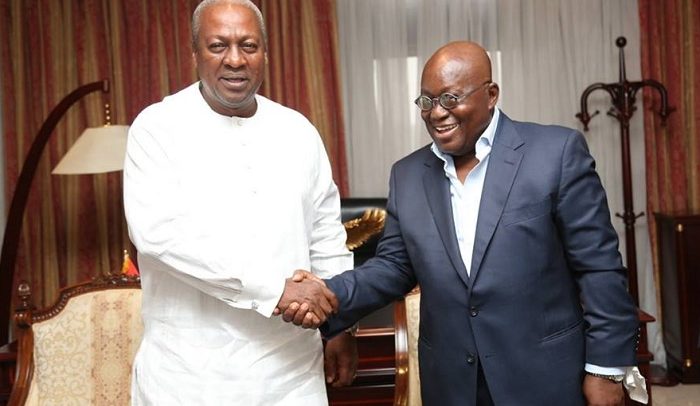John Mahama
Using 2006 constant prices, Ghana continuously recorded debt-to-GDP ratio of above 70 per cent threshold for the three out of the four years of the last NDC government. An economy qualifies for HIPC if its debt becomes unsustainable. In other words, if the debt-to-GDP ratio exceeds 70 per cent, threshold and debt services become mostly possible only after sacrificing provision of essentials to the citizens.
Indeed, debt-to-GDP ratio was 182 per cent in 2000 which essentially qualified Ghana for HIPC benefits in 2002. After successfully inching into completion decision point in 2004 in a record time, considerable proportion of Ghana’s external debt was unconditionally cancelled and in 2006 Ghana’s debt-to-GDP ratio became 26 per cent, one of the lowest in the economic history of the country. However, it went up again to 32 per cent in 2008 and the then NPP government received bashing from the Minority NDC for recklessly pushing debt-to-GDP up again. Debt became a big issue and NDC never rested until it made big political gains out of it.
As fate will have it, NDC won power that year and the expectations of many Ghanaians were that they would work hard to either maintain the debt-to-GDP ratio of 32 per cent inherited from Kufuor’s government but alas!, they kept many by surprise, when in spite of their persistent complaints in 2008, the debt-to-GDP ratio astronomically went up to 71 per cent in 2014 – sending Ghana back to HIPC status! The worsening debt situation continued and Ghana recorded a debt-to-GP ratio of 72.6 per cent in 2015 and finally 73.1 per cent in 2016. This was the situation when Akufo-Addo took over power in January, 2017. Ghana was in a HIPC status!!!
It must be emphasized that HIPC is a programme of debt relief and per the current arrangements, Ghana does not qualify for HIPC again. However, it can be in HIPC status (situation that would have qualified Ghana for HIPC if it were possible) when the country’s debt-to-GDP ratio hits the maximum threshold of 70 per cent.
Indeed, Ghana’s debt-to-GDP (69.8%) ratio fell slightly below the dreaded 70 per cent threshold in 2017. In 2018, the Ghanaian economy was rebased and became 24.2 per cent bigger. As for that matter, the country’s debt-to-GDP became better. Mathematically, debt-to-GDP is equal to TOTAL DEBT STOCK DIVIDED BY GDP AND THEN MULTILIED BY 100%. Therefore, rebasing the economy away from 2006 constant prices to the 2013 constant prices, the GDP became bigger and hence debt-to-GDP also became smaller. As for that matter, the debt-to-GDP ratio of 73.1 per cent in 2016 was estimated as 56 per cent using the new series (2013 constant prices). It should be noted that rebasing is a ritual economic exercise and therefore in the next 6 years or so, the economy will be rebased again if the conditions call for such action and once this happens, today’s debt-to-GDP ratio of 68.3 per cent will become smaller.
Indeed, if the current base year’s (2013) constant prices are used to estimate Ghana’s debt-to-GDP for the year 2002, we may not be qualified for HIPC as it was the case then. The question then is, if this happens to be so, would Ghana go to IMF and its partners to say that because the current estimates puts us away from HIPC status in 2002, they should collect back all the debt relief packages we have enjoyed? The answer is a BIG no! Ghana’s debt-to-GDP ratio was beyond the minimum set threshold of 70 per cent and the country’s debt was unsustainable in the year 2002 just as it was in the years 2014, 2015 and 2016!
Using the new series (rebased estimates), debt-to-GDP increased from 56 per cent in 2016 to 62 per cent at the end of 2019. This clearly indicates that the debt-to-GDP ratio was kept under appreciable control between 2017 and 2019! However, Covid-19 pandemic and its related adverse effects necessitated the need for the country to secure more loans – significantly as a result of which the debt-to-GDP ratio now stands at 68.3 per cent.
History (events of 2008) is repeating itself and NDC in Minority is now pontificating themselves as saints of good debt management. Should Ghanaians listen to them? Your guess is just as right as mine.
By Dr. George Domfeh, University of Ghana


